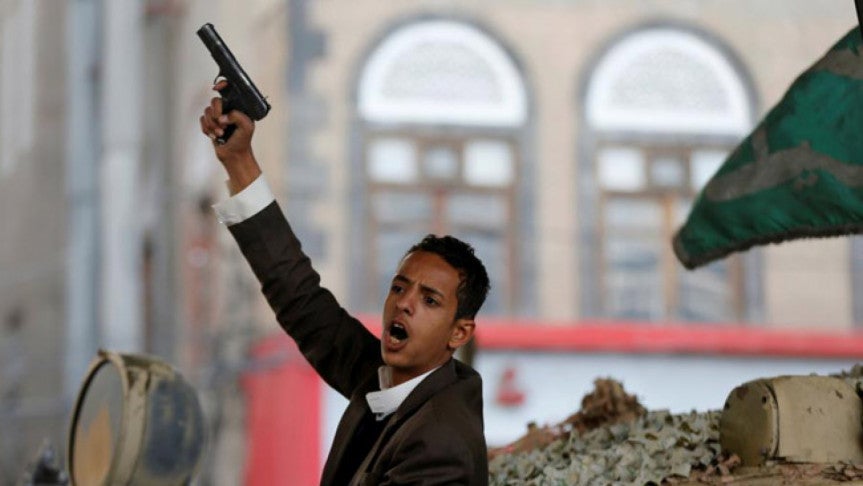Exiled son of slain Yemen ex-leader calls for revenge: Saudi-owned TV

Aden/Dubai: The son of Yemen’s ex-president Ali Abdullah Saleh has called for revenge against the armed Houthi movement that killed the veteran leader after he switched sides in the civil war, Saudi-owned al-Ekbariya TV reported on Tuesday.
The intervention by the exiled Ahmed Ali Saleh, if confirmed, could shift the balance of power yet again after a dramatic week that saw the elder Saleh abandon his Houthi allies, who responded by killing him and routing his family’s forces from the capital Sanaa in street battles.
Yemen’s civil war, pitting the Iran-allied Houthis who control Sanaa against a Saudi-led military alliance backing a government based in the south, has led to one of the world’s worst humanitarian crises, with the United Nations warning of a potential famine that could threaten the lives of millions.
Yemen’s capital Sanaa was quiet on Tuesday after five days of fighting and 25 airstrikes overnight, and UN and Red Cross aid flights had landed at the airport, UN humanitarian coordinator in Yemen Jamie McGoldrick said. The funeral of Saleh was expected later on Tuesday.
Arab states, which mainly support the Saudi-backed government, condemned the killing of the veteran ex-leader, saying his death could cause an ‘explosion’ in the country.
The death of Saleh, who once compared ruling Yemen to dancing on the heads of snakes, deepens the complexity of the multi-sided war.
Much is likely to depend on the future allegiances of his loyalists, who had helped the Houthis, a Shi’ite insurgent movement, seize and hold of much of the country until he dramatically switched sides on Saturday.
It was not immediately possible to verify the authenticity of the report of comments by his son, a former leader of the elite Republican Guards who has been exiled in the United Arab Emirates, a country that backs the Saudi-led coalition.
‘I will lead the battle until the last Houthi is thrown out of Yemen ... the blood of my father will be hell ringing in the ears of Iran,’ Ahmed Ali Saleh was quoted as saying.
He called for his father’s backers to ‘take back Yemen from the Iranian Houthi militias’.
The Arabian peninsula’s poorest country, Yemen is one of the most violent fronts in a proxy war between Saudi Arabia and Iran, who have also backed opposing sides in Syria, Iraq and elsewhere across the Middle East.
The Arab League’s general secretariat condemned the Iran-aligned Houthi movement which killed Saleh as a ‘terrorist organisation’ and demanded that the international community view it as such.
Tipping the balance
The Saudi-led coalition had been counting on Saleh’s decision to switch sides to tip the balance of a conflict that had been stalemated on the battlefield.
Saleh, who ruled in Sanaa from 1978-2012, had a strong following in Yemen, including army officers and armed tribal leaders who once served under him. His supporters may still be able to have some impact on the war.
His son Ahmed Ali has lived under house arrest in the United Arab Emirates, where he once served as ambassador before it joined ally Saudi Arabia to make war on the Houthis.
Political sources say he had been held incommunicado and under guard at a villa in the UAE capital, Abu Dhabi. His reported first public statement may indicate that his former enemies in the coalition are intending to unleash him against the Houthis.
The UAE is a key member of the mostly Gulf Arab alliance that sees the Houthis as a proxy of their arch-enemy Iran. The Gulf countries had struggled to make gains against the Houthi-Saleh alliance despite thousands of air strikes backed by Western arms and intelligence. They have used their air and sea power to tightly restrict imports, action that the United Nations says could lead to mass hunger.
Ahmed Ali appeared to have been groomed to succeed his father and he may be the family’s last chance to win back influence. The whereabouts of Saleh’s other key relatives, who had led six days of street battles against the Houthis in the capital Sanaa before being routed on Monday, were unknown.
Residents reported that fighting had subsided but that Saudi-led coalition jets pounded several targets, including the downtown presidential palace where a governing body led by Houthi-Saleh politicians had regularly convened.
The Houthi leader, Abdul Malik al-Houthi, hailed Saleh’s death in a speech on Monday as a victory against a treasonous conspiracy by Yemen’s Saudi enemies and called for a mass rally on Tuesday at a parade ground near the site of the air strikes.
He also reached out to Saleh’s political party and said his movement had no quarrel with it, underscoring the influence his allies still have in Yemen.
In the southern city of Aden, where the Saudi-backed government is based, residents set off fireworks and expressed joy. Saleh was almost universally hated throughout southern Yemen after he launched a war to unify the country in 1994, lobbing ballistic missiles at the city.
But his legacy is mixed. He is still loved in much of the north and many supporters will bear a grudge towards his killers.
Some feared Saleh’s death would only create more instability in Yemen.
‘We expect things will get worse for us. This will be the beginning of a new conflict and more bloodshed. The war will not end soon,’ said Aswan Abdu Khalid, an academic at the psychology department at the University of Aden.

 Reuters
Reuters



